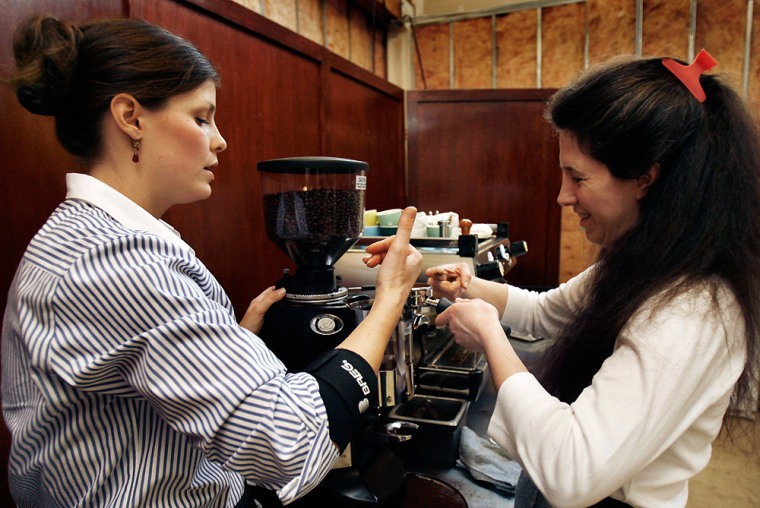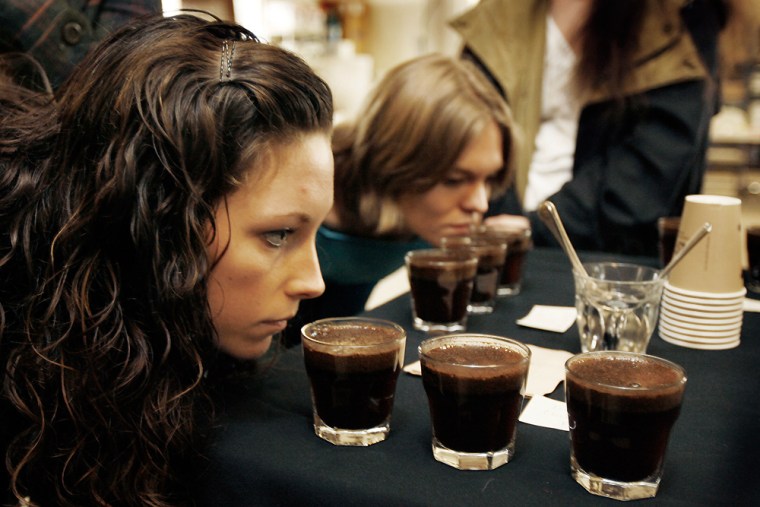Melody Katz sprayed steamy, hot water over shot glasses and set them into an espresso machine, where they caught streams of creamy brown espresso.
She swirled a glass, smelled the espresso and took a sip.
“It’s a little burnt,” said the 25-year-old bakery manager, who traveled from California for a weekend barista training workshop at Seattle’s Zoka Coffee Roaster & Tea Company.
Zoka is one of several specialty coffee roasters in Seattle that hold regular training sessions for their wholesale customers — including espresso bars, restaurants, and bakeries — on how to make a high-end espresso drinks.
And participation in these workshops has grown, roasters say. During the training sessions, which range from onsite training to weekend-long workshop events, customers learn everything from how to make rosettes, or leaf designs on the tops of drinks, to how to clean machines.
Such fancy skills might draw scoffs from blue-collar servers at the local all-night diner. But making espresso manually is an exacting skill that requires practice and precise timing, and a demanding consumer won’t hesitate to reject a poorly made drink.
“This market is so competitive,” said Joe Mancuso, general manager of Caffe D’Arte, a coffee shop and roaster. “They’re doing these types of things to make sure they can put out a better product than the competitor down the road and create a loyal customer base.”
Nationally, the number of coffee houses has nearly doubled in the past six years. According to the Specialty Coffee Association of America, there are almost 24,000 coffee houses in the U.S., up from 13,800 in 2001.
About a third of those stores are run by Starbucks Corp., the Seattle-based coffee giant whose growth has driven the specialty coffee craze. To fuel its expansion, Starbucks in recent years has dropped manual espresso machines from many stores, replacing them with automated models that are faster and more efficient.
Some people, however, miss the experience of seeing a barista pull their espresso shots by hand — including Starbucks Chairman Howard Schultz. In a recent internal memo leaked to the press, Schultz lamented that the company had “overlooked the fact that we would remove much of the romance and theatre” of making a drink, thus damaging an “intimate experience with the barista.”
Caffe D’Arte holds a weekly training session for businesses at its roasting facility, Mancuso said. And on top of that, the roaster teaches about 10 classes each week both onsite and at the roastery, he said.

The number of participants in the training sessions have increased about 25 percent each year during the past five years, Mancuso said.
Baristas have to know things like how their machine performs differently during busy hours than slow hours, he said.
For Caffe D’Arte, the training sessions are a way to help customers succeed but also to protect their brand — to ensure that the drink with their name on it represents them well, Mancuso said.
“There’s nothing worse than having great coffee and making terrible drinks with it,” said Tom Buckley, vice president of sales and marketing at Caffe Vita.
Caffe Vita, a coffee shop and roastery, has a full-time trainer who teaches customers around the country “the science or physics of making good coffee,” he said.
When the training sessions started about 12 years ago, they were by appointment only, but about four years ago, they expanded to about three days a week and about two years ago increased the sessions to five days a week, Buckley said.
Zoka holds weekend-long barista “jams” every other month for its wholesale customers and many have returned for a second go-around, said owner Jeff Babcock.
At the “cupping” portion of the weekend, about 10 customers from around the country dipped long-handled spoons into glasses of fresh coffee and took loud, bubbly slurps.
“It should be sparkling on your palate,” said Zoka’s director of coffee, Trish Skeie, to the customers.
Heather Pluska said that before coming to the training session, she had basically taught herself how to make espresso drinks by watching videos and reading leaflets.
“I like drinking coffee but don’t know too much about it,” said Pluska, who owns J’Aime Les Crepes, a crepe shop and espresso bar in Kingston, west of Seattle across Puget Sound.
Competition is fierce in her small town, she said, with 10 coffee bars already and new shops opening every year.
“Everybody thinks they can do coffee — it’s such a popular drink,” Pluska said.
Sisters Marti Dillon and Roschelle Vieira went to the session because they plan to open a coffee bar in Nampa, Idaho and hoped to become known as “coffee geeks.”
“We want to set ourselves apart from every other coffee shop,” Dillon said.
Katz, a manager at Satura Cakes in both Palo Alto and Los Altos, Calif., said she hopes her customers will notice a difference between her coffee drinks and those of nearby competitors.
“We have to bring something new to the table,” she said.
